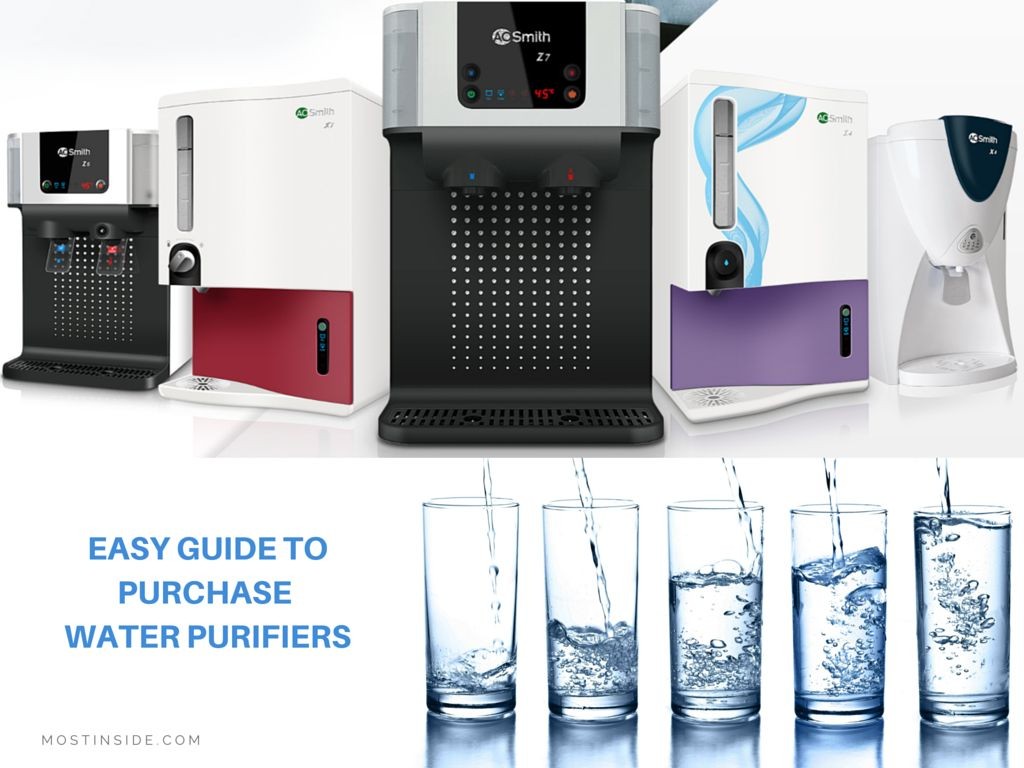Here’s an Easy Guide to Purchase Water Purifiers
This post was last updated on October 23rd, 2024

Water purifiers have now become an essential appliance that caters in maintaining optimum health by making water drinkable. The basic reason why we need to purchase water purifiers is the rising contamination of water with chemicals and recycled water definitely requires further treatment so that it not only looks and tastes clean but also has some essential minerals that our body needs from water. The tap water comprises of slight to extreme impurities that may carry water borne diseases and to insure your health in the best possible way, it is always an intelligent decision to invest in a good water purifier. This move will not only save your health but also your hard earned money, which could otherwise be in the pocket of doctors!
Why do we require water purifiers?
Not all people feel, like buying this expensive machine when they are actually satisfied that the tap water they are drinking is pure enough. People living in developed countries can hold this perception because water running from their faucets are already purified and in accordance with the government regulations, which ensures that the health of the end users’ doesn’t get hampered.
In many cases, despite the regulations, there may be chances that water holds some more impurities that may deteriorate the taste and smell of the water. Thereby, while installing a good water purifier is a must in developed countries, you cannot afford to drink water directly from taps in case you live in a developing or under-developed country.
Additionally, one of the major factors affecting the purity of water is the surroundings of the water resource and water supply. Proximity to agricultural lands or industrial manufacturing plants usually contaminate the natural water resource and many times, it is the pharmaceutical waste that makes way into water supply plants infusing the drinking water with heavy chemicals. Decades before, the water drawn from wells had low TDS (Totally Dissolved Solids) levels and was purer than water available in wells now as the land itself has become abundant in various toxic substances, which makes the water hazardous for health.
Forget about the water available in wells, the municipality supplied water on whom people blindly rely on are not pure either. This water is in fact, unsuitable for consumption as many tests conducted on this water has proven that it has huge amounts of chlorine, heavy metals (such as copper, lead and mercury), herbicides and pesticides. Though chlorine is used to disinfect water and to make it drinkable, but the very smell and taste of chlorine makes it difficult to gulp down water. Other impurities in water listed above should not be technically present in water as they may cause sickness and long term health disorders. These heavy metals generally form a part of drinking water because of rusting pipes.
Types of water purifiers:
1. Activated Carbon
These filters also have health and taste cartridges that have carbon granules, which are positively charged with silver molecules. They effectively eliminate pesticides, herbicides, radon, chlorine and other chemicals from the water. These filters are rated by the size of the particles, which are measured in microns that they can eliminate. The activated carbon filters are cheaper substitutes, which can be attached directly to the tap and can be used in places where water is pure but has impurities in terms of visible particles.
2. Ultraviolet Filters (UV)
These filters make use of ultraviolet radiation to attack and destroy the organisms that cause water borne diseases. Using energy approximately equal to a 60 watt bulb, the UV filters are the best alternatives for purifying water in places where the TDS level of water is low but impurities and germs are high. However, they are least helpful in removing heavy metals like arsenic from water and even the smell of the contaminated water won’t get eliminated. They are bit expensive in comparison to carbon filters and don’t have storage capacity.
3. Reverse Osmosis Filters (RO)
Coming cross as a more complex water purifying system, the RO water purifier has two carbon filters and a membrane that directs the water to pass through a total of four vessels before being available for final consumption. The water gets forced through a semi-permeable membrane, which filters out a number of water contaminants. These filters have the peculiar ability to remove nitrates, arsenic, sodium, lead, copper and some organic chemicals along with the fluoride added in municipality water. Despite being on the costlier side, they don’t possess the feature to kill bacteria and viruses like UV filters. However, if the water has high TDS levels, then opting for RO filters would be a wise decision.
4. Ultrafiltration (UF)
Ultrafiltration is a process that eliminates dissolved solids and even viruses and bacteria from water, which is below TDS level of 500 mg/ltr. Since it works without electricity, it is the best way to purify water in areas where there is no continuity in supply of power. It requires low maintenance and even the life span of the membranes are longer. This process, however, doesn’t reduce the TDS level of water significantly.
Of all these, it is the RO and UV water purifiers that are quite popular globally as they address major water issues. But if you are confused, which of them are best for your home, then here are pretty good points which will relieve you of this ambiguity:
1. Germ Killing Action
In RO water purifier, the germs and viruses get physically eliminated from the water, while this is not the case in UV water purifier. In the latter case, the bacteria and viruses remain in the purified water despite being killed. The UV lamp just kills the germs but their bodies are not eliminated.
2. Electricity Requirement
Though both the RO and UV filters require electricity for their basic operation, it is RO water purifier that needs electricity to boost tap water pressure. On the other hand, UV can work efficiently in normal tap water pressure.
3. Dissolved Salts
It is the dissolved salts that spoil the taste of the water. To remove these dissolved salts, you must go for RO water purifiers because UV filters can hardly eliminate their presence.
4. Water Quality For Operation
RO water purifier has pre-filtration to work with dirty water while the water must be clear for UV light to travel seamlessly.
Nowadays, many commercial reverse osmosis companies have introduced water purifiers having combined function of RO and UV that delivers impeccable performance in making water pure, healthy and tasty. So before thinking of buying a water purifier for your home, why not consider these important factors that may have remarkable influence on your purchase:
1. Storage
If you are a person who is lazy enough to wait and fill one glass of water, then you must purchase water purifiers with RO technology that come with storage facility. Even carbon filters have water storage capacity but UV filters consume electricity each time you fill a glass of water. Just ensure that when you go for RO water purifiers, they have auto cut facility.
2. Contamination
If the total dissolved salts (TDS) level in water exceeds 80 PPM, then it is suggested to install RO water purifier. In case it is lesser than 80 PPM, then opting for UV water filters would be a better decision. Generally, water supplied from rivers, lakes and harvested rain water have lower levels of TDS. On the contrary, the water drawn from bore-wells or tanker supplied water have increased amounts of hazardous chemicals along with high TDS level.
3. Water Quality
In case you live in an area where the water has huge amounts of salt or is hard or you depend on bore-wells to drink water, then you are recommended to buy RO water purifier. This purifier has gained immense popularity over the years and since it helps in warding off minutest of impurities and even any foul flavour, RO purifiers have become an indispensable part of the kitchen.
4. Water Pressure & Capacity
The RO and UV water purifiers require water to be supplied into the system and in case you don’t have this facility or the water supply is erratic, then you must buy activated carbon purifiers. Moreover, if the incoming water flow does not have the desired pressure, then the RO water purifier may probably not work with efficacy.
5. Budget
Though you may already have a budget decided for purchasing a water purifier, but there are different types of purifiers that come in different price range. To purchase water purifiers with simplest technology you will charged a price as low as Rs. 2000 and the highest of all can even be offered at Rs. 45000. So any addition in technological features can demand more money from your pocket. Moreover, the maintenance charges of the water purifiers vary and this asset will definitely require you to shell out some money periodically post purchase.
6. Electricity
Even though RO water purifiers are known to be the most efficient ones in purifying water, but their biggest flaw is that they require electricity to operate. This implies that RO purifiers are of least use in areas where power supply is not constant. This flaw also applies to UV purifiers.
Also, if you are travelling to any remote place, then you can rely upon activated carbon filters as they are compact, requires no electricity and hardly requires frequent maintenance.
7. Body Material & Weight
If you are person who is constantly on the move, then buying a water purifier with storage capacity may cause difficulty in shifting it. One of the most pertinent things to check when investing in a water purifier is that the machine must be made with material that is strong, durable, rust free and attractive. Aluminium and ABS plastic are one of the most popular materials used in water purifiers that comply with these requirements.
Coming to the crux, purchasing an important asset like water purifier requires a little research and consideration. Analysing how these machines work and how their features benefit us in consuming drinkable water is a major concern. By purchasing a good water purifier, you are investing in your long term health.
Recommended: Best Air Conditioner Brands
Recommended For You
Cleansing Your Body With Green Juices
Snehashree Bhat
A young writer who loves to pen words from creative perspective. Passionate internet surfer, a versatile homemaker and a person who finds pleasure in adopting healthier and positive changes in her persona. An enthusiastic feminist who wishes to make serious changes in the stereotypical thought process of the society via the voice of her words.




